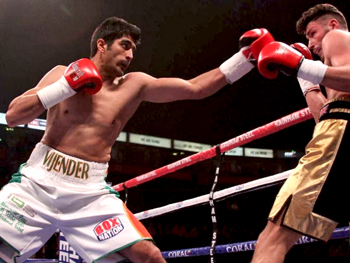New Delhi, Nov 4: Impressed with the professional debut of Vijender Singh, top British boxer Amir Khan feels that the former Olympic medallist could be the first world champion from India.
 Vijender took his first steps in the gritty world of professional boxing last month when he knocked out Sonny Whiting of England in his debut at the Manchester Arena.
Vijender took his first steps in the gritty world of professional boxing last month when he knocked out Sonny Whiting of England in his debut at the Manchester Arena.
It was clinical exhibition from the Haryana pugilist who took his time to get the measure of his opponent in the first round before unleashing a barrage of lethal power-packed punches to wrap up the issue within three rounds.
"Vijender did well in his debut. The fight was good. He is learning quickly. He is slowing himself down and boxing smartly. I think he he could be the first world champion from India," Khan told IANS here on Tuesday.
"It is hard to go from an amateur boxer to a professional boxer. There is a lot of difference between amateur boxing and the professional level. The training, fighting style, scoring system, everything is different. But Vijender seems to be handling the changes well. If he continues to learn and improve, I definitely feel that he has a great future ahead of him," he added. "Obviously, Vijender is a very good boxer. He is very smart and clever."
"We need more people like Vijender and Mary Kom in India. People like them are an inspiration for the youth which helps to promote boxing in India."
Khan, one of the top boxers in the welterweight category, currently holds the World Boxing Council (WBC) Silver Welterweight title. He is also a former two-time world champion in the lightweight category, having won the World Boxing Association (WBA) and International Boxing Federation (IBF) titles.
The 28-year-old praised the achievements of Indian boxers over the last decade and feels that the country has the potential to produce legends like his idol Mohammad Ali.
"I believe India can produce a Muhammad Ali. You have a huge population of more than a billion. With so many people, you are bound to have a lot of talent. India has the potential to produce a champion like Ali," he said.
Born to Pakistani immigrants of modest means in the English town of Bolton, Khan took to boxing at the tender age of eight. He took the world of amateur boxing by storm when he took silver in the lightweight category at the 2004 Athens Olympics at 17 -- the youngest-ever British pugilist to clinch an Olympic medal.
Khan turned pro at 19 and became one of the youngest ever British world champions, winning the WBA light welterweight title at the age of 22.
Having risen from humble roots, he now wants to give young boxers around the world a chance to achieve their dreams. He plans to launch a series of academies in India, the first of which will be set up in the Delhi-NCR region in 2016.
Khan, who also launched five academies in Karachi earlier this year, wants to start a professional boxing league in the country, involving participants from India and Pakistan.
"Indian boxers are doing really well. Your boxers are amazing. We want to promote boxing here. I want to open boxing academies in India. I am looking at opening at least five or six academies within the next 12 months," Khan said.
"There is a lot of difference between amateur boxing and the professional level. The training, fighting style, scoring system, everything is different. Professional boxing is very hard. That is why it is very hard to succeed. But Indian boxers can do well if they have the right training. That is why I am here to help.
"Vijender went to England because there is no future for him here in professional boxing. So what I want to do is to start a professional league here. We can then produce more professional world champions. People like Vijender then will not have to go to England. They can stay here and fight in front of their home fans in their own country," he added.
"If our boxers get the right training, they can definitely become world champions."





Comments
Add new comment